Do not trust sites "scanning" your device for viruses from illegal websites
Phishing/ScamAlso Known As: You've visited illegal infected website pop-up
Get free scan and check if your device is infected.
Remove it nowTo use full-featured product, you have to purchase a license for Combo Cleaner. Seven days free trial available. Combo Cleaner is owned and operated by RCS LT, the parent company of PCRisk.com.
What is the "You've visited illegal infected website" scam?
"You've visited illegal infected website" is a scam disguised as a security alert from McAfee. It must be emphasized that this fake alert is in no way associated with the McAfee anti-virus or McAfee Corp.
Scams of this type usually endorse various untrustworthy apps, e.g., adware, browser hijackers, fake anti-virus tools, and other PUAs (Potentially Unwanted Applications). However, these schemes can also ask for bogus payments or trick victims into exposing sensitive information.
Scam-promoting websites are typically accessed via mistyped URLs or redirects caused by rogue pages, intrusive ads, or installed PUAs.
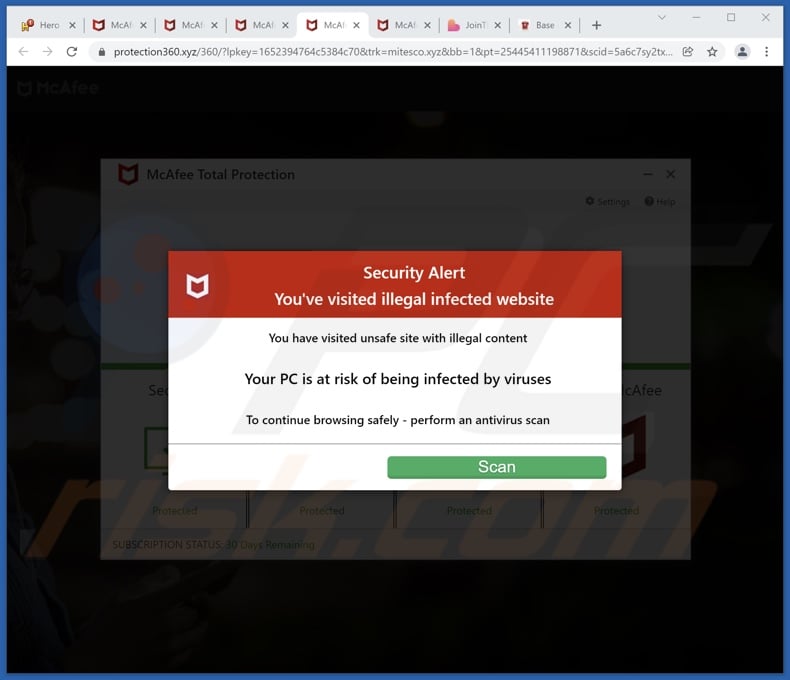
"You've visited illegal infected website" scam overview
The scam claims that users devices might have been infected when they visited a virulent website that hosts illegal content. To ensure their safety, users are urged to perform a system scan through the deceptive site. It must be stressed that no website can perform system scans or detect threats/issues. Therefore, any that make such claims - are scams.
Most scams like "You've visited illegal infected website" are designed to promote untrustworthy/harmful software. For example, they can push fake anti-viruses, adware, browser hijackers, and other PUAs. The presence of such software on systems endangers device integrity and user privacy.
In some cases, schemes of this kind also request victims to make various fake payments (e.g., subscription, registration, app purchase, etc.). Additionally, the scam may redirect users to dubious payment gateways, which can record entered data (e.g., personally identifiable information, credit card numbers, banking account details, etc.).
To summarize, by trusting the "You've visited illegal infected website" scam, users can experience system infections, severe privacy issues, financial losses, and even identity theft.
Should it be impossible to close a deceptive webpage, it can be done by ending the browser's process with Windows Task Manager. Note that when the browser is reopened - the previous browsing session must not be restored, as that would open the scam site again.
| Name | You've visited illegal infected website pop-up |
| Threat Type | Phishing, Scam, Social Engineering, Fraud |
| Fake Claim | Scam claims users' devices might have been infected through a malicious website they had visited. |
| Disguise | Scam is disguised as a security alert from McAfee. |
| Related Domains | protocolmixflow[.]com, stylechainconnect[.]com, virusscanner[.]pro, protection360[.]xyz, ta23ll-unli87ke[.]xyz, networkdeepchains[.]co.in, gansuprous[.]com, unjerincity[.]com, movelatic[.]com, discoverpcpotential[.]com, unknownfundamentals[.]com, lifebestconcept[.]com, jerenga[.]click, pclifebasics[.]com, strongpcfundamentals[.]com, lifepcessentials[.]com, kerbians[.]click, powerpcfact[.]com, stablepcprotection[.]com, reliablepcstrength[.]com, evnilost[.]xyz, control-scanning[.]com, protectusonline[.]xyz, trackedpcscanner[.]com, validitysupport[.]com, validitysaver[.]com, protectsoftware[.]xyz, chainedprotol[.]com, basicnetworkpc[.]com, window-safe[.]com, homecarelesspower[.]click, window-save[.]com, mund35ane-cha11nnel[.]xyz, hugeer[.]club. defenderweb[.]xyz, jonne[.]club, now-scan[.]com, defenderlab[.]xyz, hexaput0n[.]click, pc-tools-2022[.]xyz, antivirus-here[.]com, personal-scan[.]com, antivirus-click[.]com, protectwatch[.]xyz, antivirus-defence[.]com, defender-box[.]xyz, defenderfocus[.]xyz, posto[.]click, track-scanner[.]com, series-protection[.]com, allprotectpc[.]com, defenderpage[.]xyz, antivirus-stability[.]com, sopuw[.]click |
| Detection Names (protection360[.]xyz) | Fortinet (Malware), alphaMountain.ai (Suspicious), Certego (Suspicious), Forcepoint ThreatSeeker (Suspicious), Full List Of Detections (VirusTotal) |
| Symptoms | Fake error messages, fake system warnings, pop-up errors, hoax computer scan. |
| Distribution methods | Compromised websites, rogue online pop-up ads, potentially unwanted applications. |
| Damage | Loss of sensitive private information, monetary loss, identity theft, possible malware infections. |
| Malware Removal (Windows) |
To eliminate possible malware infections, scan your computer with legitimate antivirus software. Our security researchers recommend using Combo Cleaner. Download Combo CleanerTo use full-featured product, you have to purchase a license for Combo Cleaner. 7 days free trial available. Combo Cleaner is owned and operated by RCS LT, the parent company of PCRisk.com. |
Online scams in general
There are many scams that use the names of legitimate entities to increase the impression of legitimacy, e.g., "McAfee - Your PC is infected with 5 viruses!", "Microsoft Windows Virus Alert", "Norton Security - Your PC is infected with 5 viruses!", "Avira - Your Pc May Have Been Infected", and so on.
In fact, the Internet is rife with misleading, deceptive, and malicious content. Widespread scam models include - fake virus alerts, outdated/missing software notifications, hoax lotteries/raffles and giveaways, unbelievable offers and deals, etc.
Regardless of what schemes offer or how they operate - their sole goal is to generate revenue at victims' expense. Therefore, it is crucial to exercise caution when browsing.
How did potentially unwanted applications install on my computer?
PUAs can have "official" promotional/download sites. Unwanted apps are also proliferated via downloaders/installers of other programs. This deceptive marketing method is called "bundling". Intrusive advertisements are used to spread PUAs as well. Upon being clicked, the adverts can execute scripts to make stealthy downloads/installations.
How to avoid installation of potentially unwanted applications?
It is recommended to research software and only download it from official and verified channels. Untrustworthy sources, e.g., unofficial and freeware sites, Peer-to-Peer sharing networks, etc. - often offer bundled content.
When downloading/installing, it is important to read terms, explore possible options, and use the "Custom/Advanced" settings to opt-out of all additions. Intrusive ads appear harmless yet redirect to highly questionable websites (e.g., gambling, pornography, etc.).
In case of encounters with such adverts/redirects, the system must be inspected and all suspicious applications and browser extensions/plug-ins detected - removed without delay. If your computer is already infected with PUAs, we recommend running a scan with Combo Cleaner Antivirus for Windows to automatically eliminate them.
Text presented in "You've visited illegal infected website" scam pop-up:
Security Alert
You've visited illegal infected website
You have visited unsafe site with illegal content
Your PC is at risk of being infected by viruses
To continue browsing safely - perform an antivirus scan
[Scan]
The appearance of "You've visited illegal infected website" pop-up scam (GIF):
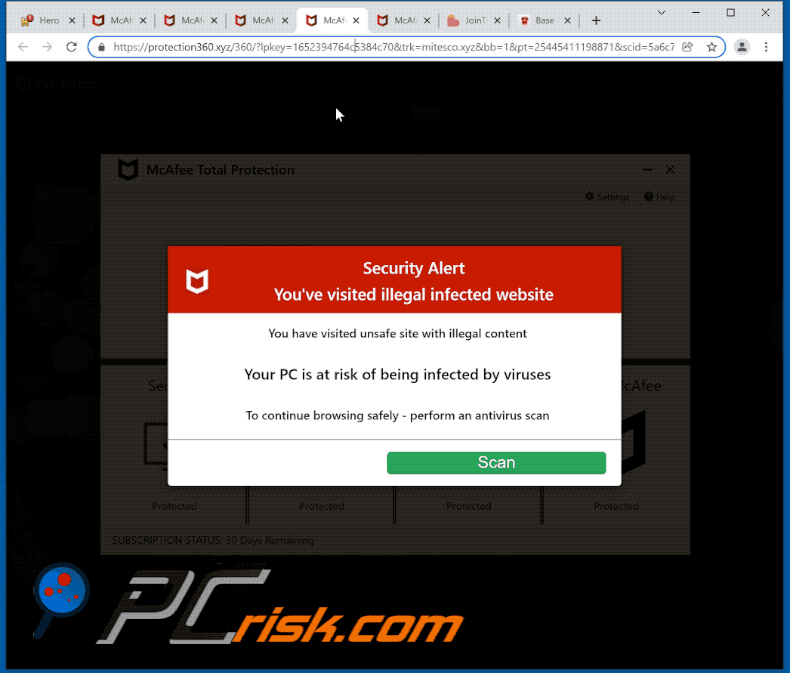
Other variants of "You've Visited Illegal Infected Website" pop-up scam:
Sample 1:
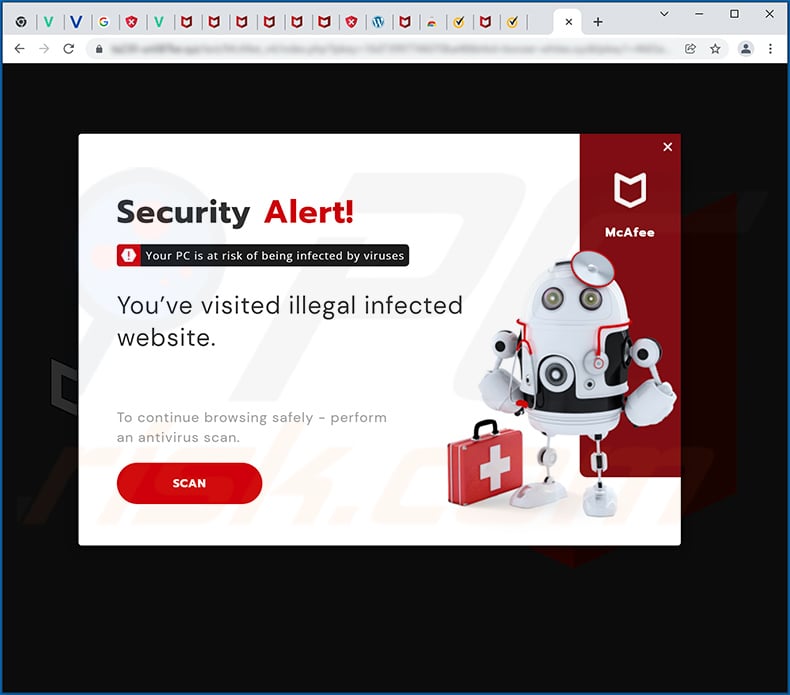
Sample 2:
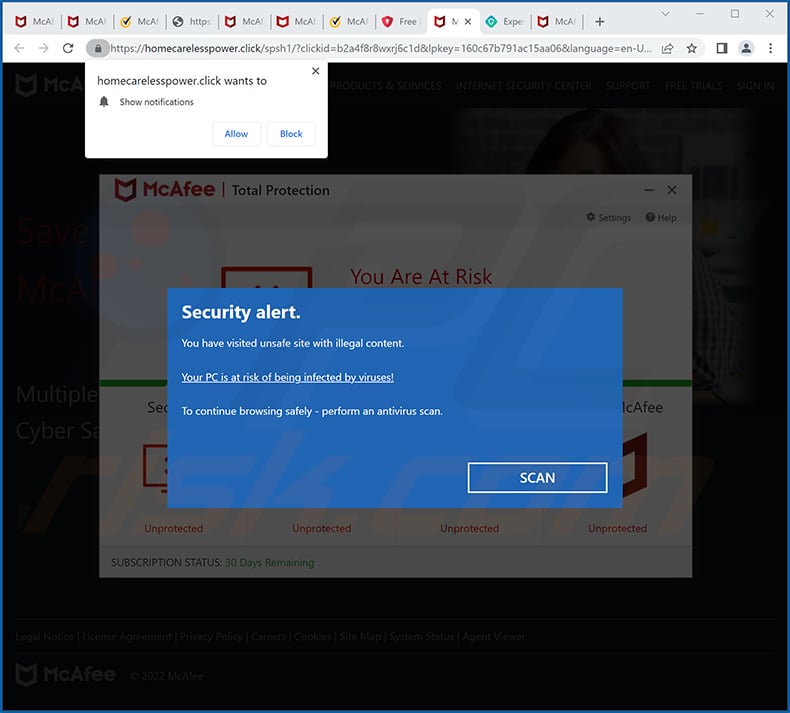
Text presented within:
Security alert.
You have visited unsafe site with illegal content.
Your PC is at risk of being infected by viruses!
To continue browsing safely - perform an antivirus scan.
Sample 3:
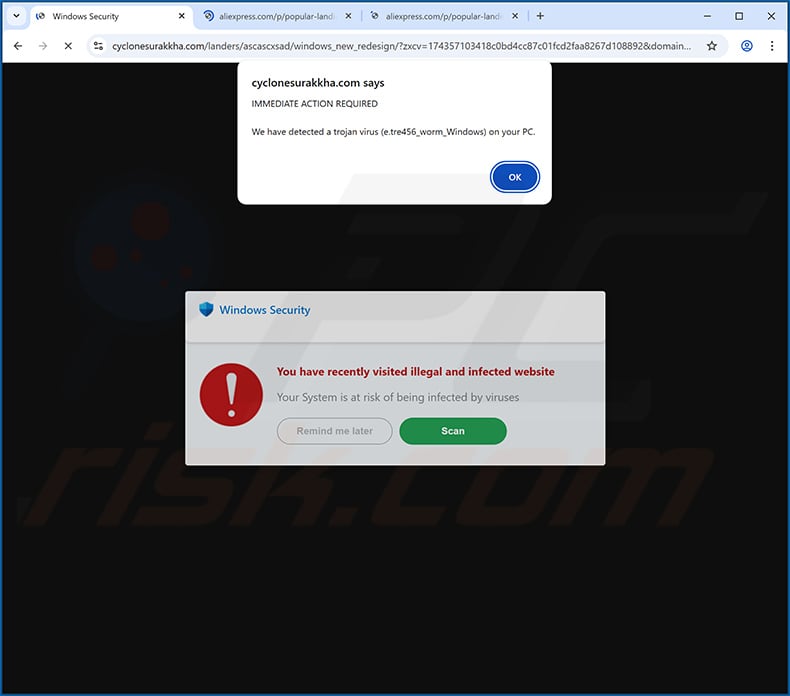
Text presented within:
Windows Security
You have recently visited illegal and infected website
Your System is at risk of being infected by viruses
[Remind me later] [Scan]
Instant automatic malware removal:
Manual threat removal might be a lengthy and complicated process that requires advanced IT skills. Combo Cleaner is a professional automatic malware removal tool that is recommended to get rid of malware. Download it by clicking the button below:
DOWNLOAD Combo CleanerBy downloading any software listed on this website you agree to our Privacy Policy and Terms of Use. To use full-featured product, you have to purchase a license for Combo Cleaner. 7 days free trial available. Combo Cleaner is owned and operated by RCS LT, the parent company of PCRisk.com.
Quick menu:
- What is You've visited illegal infected website pop-up?
- How to identify a pop-up scam?
- How do pop-up scams work?
- How to remove fake pop-ups?
- How to prevent fake pop-ups?
- What to do if you fell for a pop-up scam?
How to identify a pop-up scam?
Pop-up windows with various fake messages are a common type of lures cybercriminals use. They collect sensitive personal data, trick Internet users into calling fake tech support numbers, subscribe to useless online services, invest in shady cryptocurrency schemes, etc.
While in the majority of cases these pop-ups don't infect users' devices with malware, they can cause direct monetary loss or could result in identity theft.
Cybercriminals strive to create their rogue pop-up windows to look trustworthy, however, scams typically have the following characteristics:
- Spelling mistakes and non-professional images - Closely inspect the information displayed in a pop-up. Spelling mistakes and unprofessional images could be a sign of a scam.
- Sense of urgency - Countdown timer with a couple of minutes on it, asking you to enter your personal information or subscribe to some online service.
- Statements that you won something - If you haven't participated in a lottery, online competition, etc., and you see a pop-up window stating that you won.
- Computer or mobile device scan - A pop-up window that scans your device and informs of detected issues - is undoubtedly a scam; webpages cannot perform such actions.
- Exclusivity - Pop-up windows stating that only you are given secret access to a financial scheme that can quickly make you rich.
Example of a pop-up scam:

How do pop-up scams work?
Cybercriminals and deceptive marketers usually use various advertising networks, search engine poisoning techniques, and shady websites to generate traffic to their pop-ups. Users land on their online lures after clicking on fake download buttons, using a torrent website, or simply clicking on an Internet search engine result.
Based on users' location and device information, they are presented with a scam pop-up. Lures presented in such pop-ups range from get-rich-quick schemes to fake virus scans.
How to remove fake pop-ups?
In most cases, pop-up scams do not infect users' devices with malware. If you encountered a scam pop-up, simply closing it should be enough. In some cases scam, pop-ups may be hard to close; in such cases - close your Internet browser and restart it.
In extremely rare cases, you might need to reset your Internet browser. For this, use our instructions explaining how to reset Internet browser settings.
How to prevent fake pop-ups?
To prevent seeing pop-up scams, you should visit only reputable websites. Torrent, Crack, free online movie streaming, YouTube video download, and other websites of similar reputation commonly redirect Internet users to pop-up scams.
To minimize the risk of encountering pop-up scams, you should keep your Internet browsers up-to-date and use reputable anti-malware application. For this purpose, we recommend Combo Cleaner Antivirus for Windows.
What to do if you fell for a pop-up scam?
This depends on the type of scam that you fell for. Most commonly, pop-up scams try to trick users into sending money, giving away personal information, or giving access to one's device.
- If you sent money to scammers: You should contact your financial institution and explain that you were scammed. If informed promptly, there's a chance to get your money back.
- If you gave away your personal information: You should change your passwords and enable two-factor authentication in all online services that you use. Visit Federal Trade Commission to report identity theft and get personalized recovery steps.
- If you let scammers connect to your device: You should scan your computer with reputable anti-malware (we recommend Combo Cleaner Antivirus for Windows) - cyber criminals could have planted trojans, keyloggers, and other malware, don't use your computer until removing possible threats.
- Help other Internet users: report Internet scams to Federal Trade Commission.
Frequently Asked Questions (FAQ)
What is a pop-up scam?
Pop-ups scams are deceptive messages aiming to lure/scare users into performing certain actions (e.g., making payments, downloading files, installing untrustworthy or malicious software, calling fake helplines, disclosing sensitive information, etc.).
What is the purpose of a pop-up scam?
Most pop-up scams aim only to generate revenue. Scammers can profit from deceptively obtained funds, sale or abuse of private data, software promotion, malware proliferation, and so forth.
Why do I encounter fake pop-ups?
Pop-up scams are promoted on suspect webpages, which are seldom accessed intentionally. Most users enter scam sites via mistyped URLs or redirects caused by browser notifications/ intrusive advertisements, rogue pages, or installed harmful software.
Will Combo Cleaner protect me from pop-up scams?
Combo Cleaner is capable of scanning the websites you visit and informing you if they are found to be rogue, deceptive, or malicious. Additionally, Combo Cleaner can restrict all further access to such sites.
Share:

Tomas Meskauskas
Expert security researcher, professional malware analyst
I am passionate about computer security and technology. I have an experience of over 10 years working in various companies related to computer technical issue solving and Internet security. I have been working as an author and editor for pcrisk.com since 2010. Follow me on Twitter and LinkedIn to stay informed about the latest online security threats.
PCrisk security portal is brought by a company RCS LT.
Joined forces of security researchers help educate computer users about the latest online security threats. More information about the company RCS LT.
Our malware removal guides are free. However, if you want to support us you can send us a donation.
DonatePCrisk security portal is brought by a company RCS LT.
Joined forces of security researchers help educate computer users about the latest online security threats. More information about the company RCS LT.
Our malware removal guides are free. However, if you want to support us you can send us a donation.
Donate
▼ Show Discussion